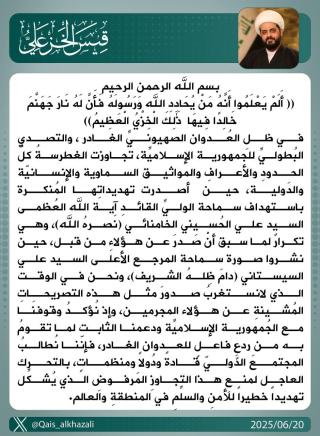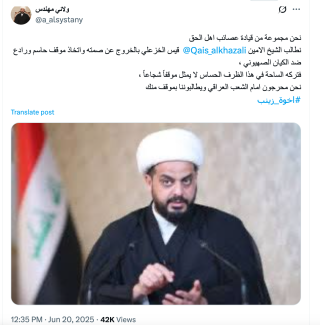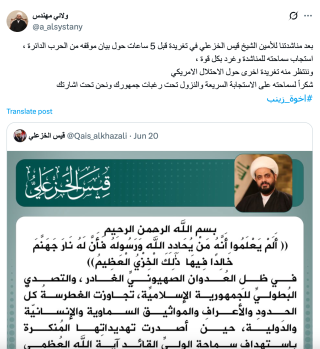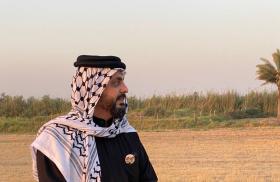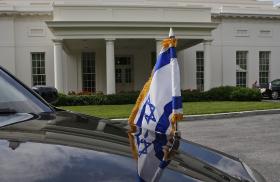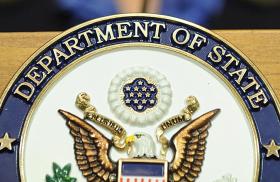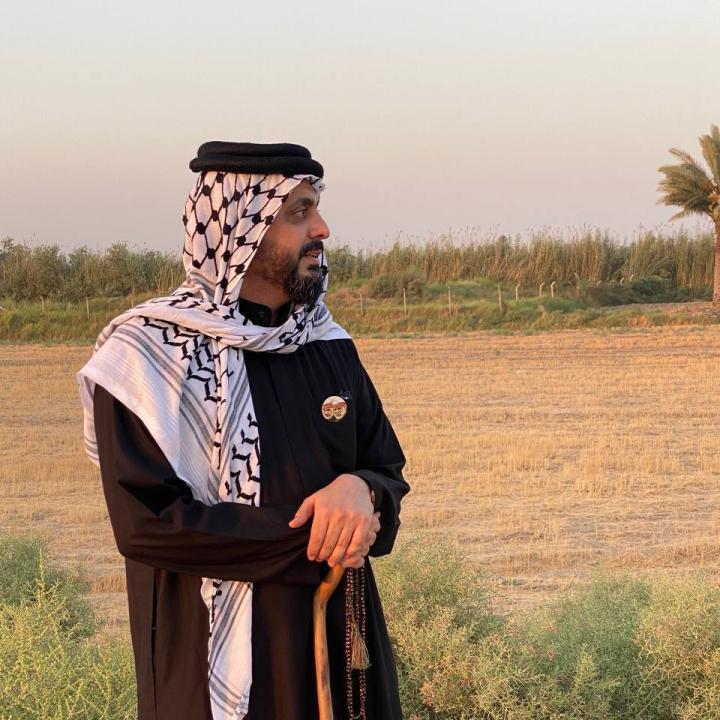
Qais al-Khazali Tries, Fails to Tone Down Militant Bluster

Khazali finally reacted to the Iran-Israel conflict to avoid further embarrassing his militant base, underlining the difficulties of being a surface politician and a closet terrorist.
It took Qais al-Khazali, the leader of the Iraqi militia Asaib Ahl al-Haq (AAH), seven days to publicly react to the Iran-Israel conflict. While his counterparts in other Iran-backed militias were quick to release aggressive statements, Khazali initially delegated the response to his militia’s security chief, Jawad al-Talibawi. Under mounting pressure, however, he apparently felt compelled to speak out personally.
In a belated statement issued June 20, Khazali condemned the “abhorrent threats to target the guardian leader, Grand Ayatollah Sayyed Ali al-Husseini Khamenei.” But unlike his counterpart Akram Kaabi—the leader of Harakat Hezbollah al-Nujaba, who previously threatened to attack U.S. military assets, diplomats, and even ordinary American citizens if Khamenei were harmed—Khazali made no such threats. Instead, he appealed to “the international community...to take urgent action to prevent this unacceptable transgression, which poses a serious threat to security and peace in the region and the world” (Figure 1).
Under Pressure from Militant Base
Khazali’s seven-day silence generated pressure and even a sense of “embarrassment” within the self-styled muqawama (resistance) circles. Just hours before his eventual statement, the Twitter/X handle "Walai Muhandis"—a little-known account with only 114 followers—posted a provocative message tagging Khazali’s account: “We, a group from the leadership of Asaib Ahl al-Haq, call on Sheikh al-Amin, Qais al-Khazali...to break his silence and take a firm and decisive stance against the Zionist entity. His absence from the scene at this sensitive time does not reflect a courageous position. We are embarrassed in front of the Iraqi people, who are demanding a response from you” (Figure 2).
Despite the account's tiny number of followers, the Walai Muhandis post gained major traction, receiving over 42,000 views and more than 200 comments as of June 24—highlighting how sensitive and important this issue is in Iraq, particularly among the Shia population. While the identity of the account owner cannot be verified and his claim of being a senior AAH member remains unconfirmed, the user clearly understood the pressure this issue was placing on AAH and Khazali.
Notably, Walai Muhandis quickly responded to Khazali’s eventual statement, appearing to praise it while simultaneously calling for a firmer stance: “Following our appeal to Sheikh al-Amin Qais al-Khazali in a post five hours ago regarding his position on the ongoing war, His Eminence responded to the call and issued a powerful tweet. We now await another tweet from him regarding the American occupation" (Figure 3).
Khazali's Balancing Act: Reformed Politician or Closet Terrorist?
Throughout the post-October 7 chain of events, Khazali has shown a tendency to distance himself from aggressive rhetoric and kinetic action. His ideological roots remain deeply extremist and firmly tied to the Iranian regime, and he still portrays his role in the deaths of unarmed Americans as "honorable." Yet his pragmatic instincts are becoming more visible. His recent appeal to the international community to help end the war and maintain the peace in the region marks a clear departure from the traditional rhetoric of the muqawama, particularly among its more radical factions.
This reflects Khazali’s ambitions and his ongoing attempt to have the best of both worlds: to remain a prominent figure within the so-called "axis of resistance," with all the influence and benefits that status confers, while also positioning himself as a credible political actor who can be accepted and trusted by domestic and international stakeholders. In moments when escalation risks triggering U.S. or Israeli retaliation, his pragmatism and survival instincts take precedence. But when potential costs are lower, his ideological extremism resurfaces, underscoring the dual nature of his public persona. If U.S. sanctions pressure were lifted on Khazali, he could very easily flex back toward the militancy that got him designated for terrorism and human rights abuses in the first place.
To truly distance himself from Iran’s Islamic Revolutionary Guard Corps and from anti-civilian violence in Iraq, Khazali would need to take major risks. As one of the authors noted in a previous article, “Qais and AAH need to cease their violent attacks on Iraqi civilians, show a clean record in the next November 2025 national elections and subsequent government formation period, and power down the rampant AAH penetration of Iraq’s economic levers, especially oil smuggling activities that often benefit Iran...Qais would also need to show real commitment to changing the nature of his organization permanently and entering a truth and reconciliation process to account for the movement’s crimes against Iraqi civilians.”

